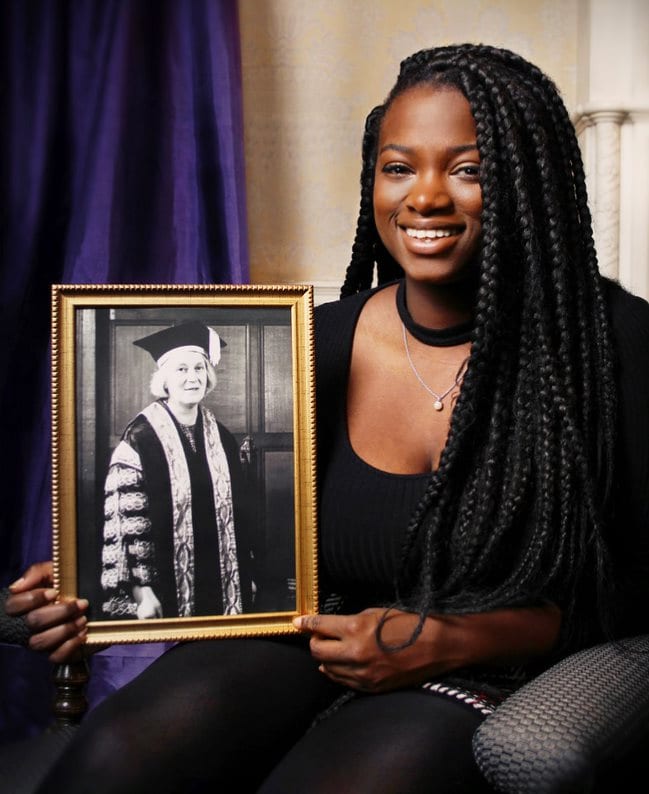To mark the 2018 centenary of the first British women winning the right to vote, we are honouring Bristol women who have changed our institution, and the world. From our first woman lecturer to the first British woman to have won a Nobel Prize, these activists, educators and agitators now take their rightful place on the walls of the Wills Memorial building – along with ten of the women in today’s University community to who continue to be inspired by their legacy.
 Professor Dorothy Hodgkin, First British woman to win a Nobel Prize and former Chancellor of the University of Bristol, with Lara Lalemi, Chemistry PhD student
Professor Dorothy Hodgkin, First British woman to win a Nobel Prize and former Chancellor of the University of Bristol, with Lara Lalemi, Chemistry PhD student
“Dorothy was the University’s fifth Chancellor from 1970 to 1988. She was a pioneer in the field of protein crystallography and was the first British woman to win a Nobel Prize, receiving it for Chemistry in 1964.
“Dorothy’s interest in chemistry started when she was just 10 years old and she was one of only two girls at secondary school who were allowed to join the boys as they studied the subject. She went on to achieve a first-class honours degree from the University of Oxford – only the third woman to achieve this distinction.
“She was awarded the Nobel Prize for her pioneering work on protein crystallography and the structures of vitamin B12 and penicillin. Her work helped to unravel the detailed 3D structures of proteins, including insulin, fundamentally shaping our understanding of living organisms. In Bristol, Dorothy is remembered as our second longest serving Chancellor. She proved to be a hands-on Chancellor, attending many University meetings and functions, public lectures and lunching with student officers in the Union.
“Dorothy remains the only British woman to have received a Nobel Prize in any of the three sciences it recognises. Not only was she an amazing scientist, but an icon for many women in science. As someone who has studied her work some 50 years later, I’m struck by its impact and how she managed to achieve such a major breakthrough at a time when so few women were even studying Chemistry, let alone supporting the growth of modern medicine.”
________________________________________
The University of Bristol was the first higher education institution in England to welcome women on an equal basis to men, but our commitment to gender equality reaches far beyond this milestone. The wooden panels of the Great Hall in its Wills Memorial Building have been an all-male domain thanks to hosting portraits of its Vice-Chancellors. But now, thanks to a project specially-commissioned to mark 100 years since the first women in Britain won the right to vote, a series of ten portraits redresses the balance and celebrates notable Bristol women who have changed the institution – and, indeed, the world.
